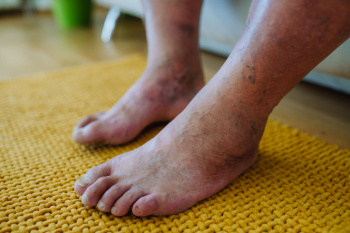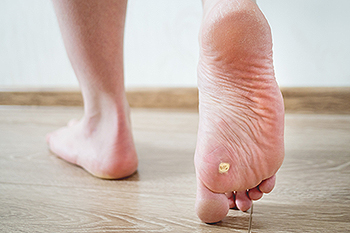159 North 3rd Street
Macclenny, Florida 32063

When it comes to foot and ankle health, personalized care makes all the difference. Every patient has unique needs based on their lifestyle, activity level, and medical history. A podiatrist who offers individualized care can create a treatment plan tailored specifically to you. This means better results, faster relief from pain, and a lower risk of future problems. Personalized care starts with listening. A podiatrist takes time to understand your concerns, whether you are dealing with heel pain, bunions, arthritis, or diabetic foot issues. They assess your foot structure, gait, and any underlying conditions before recommending treatment. These might include custom orthotics, footwear guidance, targeted exercises, or minimally invasive procedures. With customized treatment, patients often experience greater comfort and improved mobility. If you are having foot or ankle problems, it is suggested that you seek care from a podiatrist for a proper diagnosis and treatment appropriate to your needs.
If you are experiencing pain in the feet or ankles, don’t join the stubborn majority refusing treatment. Feel free to contact Dr. John L. Coleman from Florida. Our doctor can provide the care you need to keep you pain-free and on your feet.
What Is a Podiatrist?
Someone would seek the care of a podiatrist if they have suffered a foot injury or have common foot ailments such as heal spurs, bunions, arch problems, deformities, ingrown toenails, corns, foot and ankle problems, etc.
Podiatric Treatment
A podiatrist will treat the problematic areas of the feet, ankle or lower leg by prescribing the following:
A common podiatric procedure a podiatrist will use is a scanner or force plate which will allow the podiatrist to know the designs of orthotics. Patients are then told to follow a series of tasks to complete the treatment. The computer will scan the foot a see which areas show weight distribution and pressure points. The podiatrist will read the analysis and then determine which treatment plans are available.
If you have any questions please feel free to contact our office located in Macclenny, FL . We offer the newest diagnostic and treatment technologies for all your foot and ankle needs.

Gait disorders in the elderly significantly affect the feet, leading to discomfort, instability, and a higher risk of falls. These conditions often result from musculoskeletal issues, neurological disorders, or chronic diseases, such as arthritis and diabetes. Weakness in the foot muscles, joint stiffness, and loss of sensation contribute to unsteady movement, increasing the likelihood of injuries. Pain and deformities like bunions or hammertoes further disrupt balance, making walking difficult. Reduced mobility leads to a loss of freedom and independence, affecting mental well-being and overall quality of life. Fear of falling may cause seniors to limit their activities, resulting in muscle weakness and further instability. If you are elderly or caring for an elderly individual and notice a change in the feet or walking patterns, it is suggested that you consult a podiatrist who can offer corrective treatment and proper foot health guidance.
Proper foot care is something many older adults forget to consider. If you have any concerns about your feet and ankles, contact Dr. John L. Coleman from Florida. Our doctor can provide the care you need to keep you pain-free and on your feet.
The Elderly and Their Feet
As we age we start to notice many changes in our body, but the elder population may not notice them right away. Medical conditions may prevent the elderly to take notice of their foot health right away. Poor vision is a lead contributor to not taking action for the elderly.
Common Conditions
Susceptible Infections
Diabetes and poor circulation can cause general loss of sensitivity over the years, turning a simple cut into a serious issue.
If you have any questions please feel free to contact our office located in Macclenny, FL . We offer the newest diagnostic and treatment technologies for all your foot and ankle needs.

Proper foot care is essential for individuals with diabetes to prevent serious complications. Keeping the feet clean by washing them daily with mild soap and warm water helps reduce the risk of infections. Thoroughly drying the feet, especially between the toes, prevents excess moisture that can lead to fungal infections. Moisturizing dry skin is important to prevent cracks that may allow bacteria to enter. Regularly inspecting the feet for cuts, blisters, or changes in skin color can help detect problems early. Practicing healthy foot habits, such as wearing well-fitted shoes and avoiding walking barefoot, reduces the risk of injuries. Poor circulation and nerve damage associated with diabetes make foot care a priority. If you have diabetes, it is strongly suggested that you are under the care of a podiatrist who can help you to manage this serious condition.
Diabetic foot care is important in preventing foot ailments such as ulcers. If you are suffering from diabetes or have any other concerns about your feet, contact Dr. John L. Coleman from Florida. Our doctor can provide the care you need to keep you pain-free and on your feet.
Diabetic Foot Care
Diabetes affects millions of people every year. The condition can damage blood vessels in many parts of the body, especially the feet. Because of this, taking care of your feet is essential if you have diabetes, and having a podiatrist help monitor your foot health is highly recommended.
The Importance of Caring for Your Feet
Patients with diabetes should have their doctor monitor their blood levels, as blood sugar levels play such a huge role in diabetic care. Monitoring these levels on a regular basis is highly advised.
It is always best to inform your healthcare professional of any concerns you may have regarding your feet, especially for diabetic patients. Early treatment and routine foot examinations are keys to maintaining proper health, especially because severe complications can arise if proper treatment is not applied.
If you have any questions please feel free to contact our office located in Macclenny, FL . We offer the newest diagnostic and treatment technologies for all your foot and ankle needs.

Plantar warts develop on the bottom of the foot due to exposure to the human papillomavirus, or HPV, often found in warm, damp environments. Some plantar warts resolve on their own, but others may require treatment. It is important to seek professional care, as attempting to remove a plantar wart at home improperly can damage healthy skin and increase discomfort. A podiatrist can provide several options, including applying salicylic acid to break down the wart over time or using cryotherapy to freeze it off with liquid nitrogen. If the wart is persistent, additional treatments may be necessary. Among them are curettage to remove the wart surgically, laser therapy to target the blood vessels feeding the wart, or prescription medication applied directly to the affected area. Plantar warts that are deep or cause pain may require a combination of treatments for effective removal. If you notice an unusual or painful growth on the bottom of your foot, it may indicate a plantar wart, and it is suggested that you schedule an appointment with a podiatrist for an exam, diagnosis, and treatment options.
Plantar warts can be very uncomfortable. If you need your feet checked, contact Dr. John L. Coleman from Florida. Our doctor will assist you with all of your foot and ankle needs.
About Plantar Warts
Plantar warts are the result of HPV, or human papillomavirus, getting into open wounds on the feet. They are mostly found on the heels or balls of the feet.
While plantar warts are generally harmless, those experiencing excessive pain or those suffering from diabetes or a compromised immune system require immediate medical care. Plantar warts are easily diagnosed, usually through scraping off a bit of rough skin or by getting a biopsy.
Symptoms
Treatment
To help prevent developing plantar warts, avoid walking barefoot over abrasive surfaces that can cause cuts or wounds for HPV to get into. Avoiding direct contact with other warts, as well as not picking or rubbing existing warts, can help prevent the further spread of plantar warts. However, if you think you have developed plantar warts, speak to your podiatrist. He or she can diagnose the warts on your feet and recommend the appropriate treatment options.
If you have any questions please feel free to contact our office located in Macclenny, FL . We offer the newest diagnostic and treatment technologies for all your foot and ankle needs.